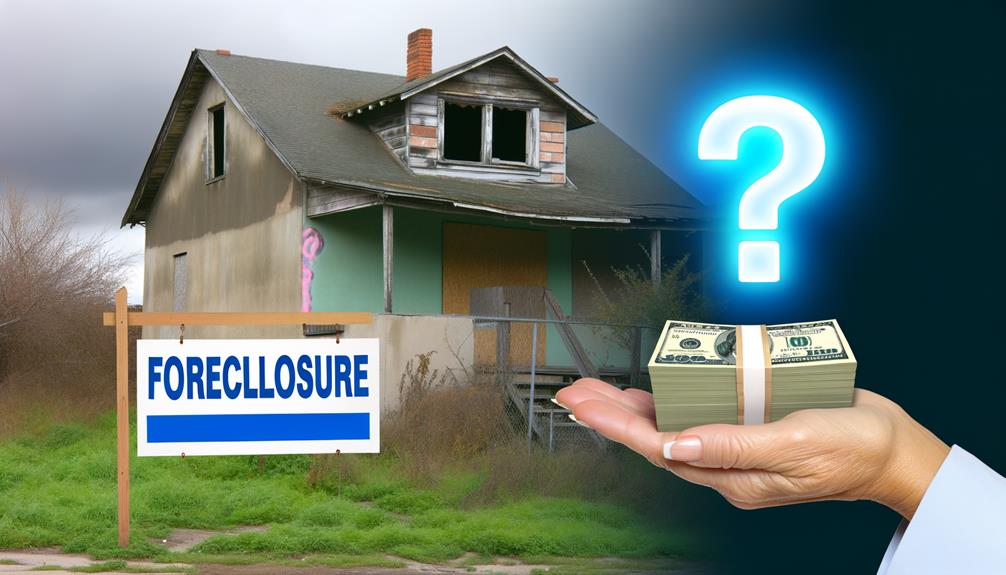The purchase of a foreclosed house often brings to mind the image of a cash transaction, perhaps due to the perceived urgency and competitiveness of such sales. However, this is not necessarily the case.
In reality, there are several financing options available to prospective buyers of foreclosed properties, including not only conventional mortgage loans but also specialized foreclosure loans and government-backed options such as FHA loans.
As we explore these possibilities in further detail, we invite you to consider how such strategies could potentially reshape your approach to acquiring a foreclosed property.
Key Takeaways
- Cash offers are not always necessary when buying foreclosed homes, as banks often prefer buyers who secure bank loans.
- Not all foreclosed properties are in disrepair, and renovation financing options are available for homes needing improvement.
- Traditional mortgages, private financing, and government-backed loans are financing options for purchasing foreclosed homes.
- Conventional mortgages are widely accepted among traditional lenders and can be used for potential renovation projects.
Understanding Foreclosure Properties
How can one navigate the complex world of buying foreclosure properties, given the multitude of financing options, the need for understanding the unique dynamics of such properties, and the potential risks and rewards involved?
The first step is to comprehend the foreclosure process. It begins when a borrower defaults on their mortgage payments, leading the lender to issue a notice of default. If the borrower fails to rectify the situation, the home could end up in a foreclosure auction.
When planning to purchase a foreclosed home, it is crucial to understand the various financing options available, such as conventional mortgages, FHA loans, private loans, or even innovative methods like crowdfunding. Each option has its unique benefits and potential drawbacks which must be carefully evaluated.
Buying a foreclosed property is not without risks. These homes often require extensive renovations, and there may be additional legal hurdles to clear. However, the rewards can be substantial if you're prepared and knowledgeable about the process. Payments are usually made through a cashier's check, ensuring a safe and traceable transaction.
Debunking Foreclosure Myths
While understanding the foreclosure process and financing options is crucial, it's equally important to dispel prevalent misconceptions that might cloud judgment when purchasing foreclosed homes.
One of the most persistent myths is that buying foreclosed homes always require cash. While cash offers can be attractive to sellers, they are not a necessity. Banks, in fact, often prefer buyers who secure bank loans, as it ensures that the full amount will be paid. Additionally, financing options like traditional mortgages, specialized foreclosure loans and government-backed loans are available to those wishing to buy a foreclosed property. Therefore, the notion that the purchase of foreclosed homes necessitates a large amount of ready cash is a fallacy.
Another myth is that all foreclosed properties are in disrepair. While some may need renovations, many are in perfectly habitable condition. There are even renovation financing options available for homes needing improvement.
Debunking foreclosure myths like these helps potential buyers make informed decisions, eliminating fear and uncertainty from the equation, and fostering a sense of belonging in the community of homeowners.
Financing Options for Foreclosures
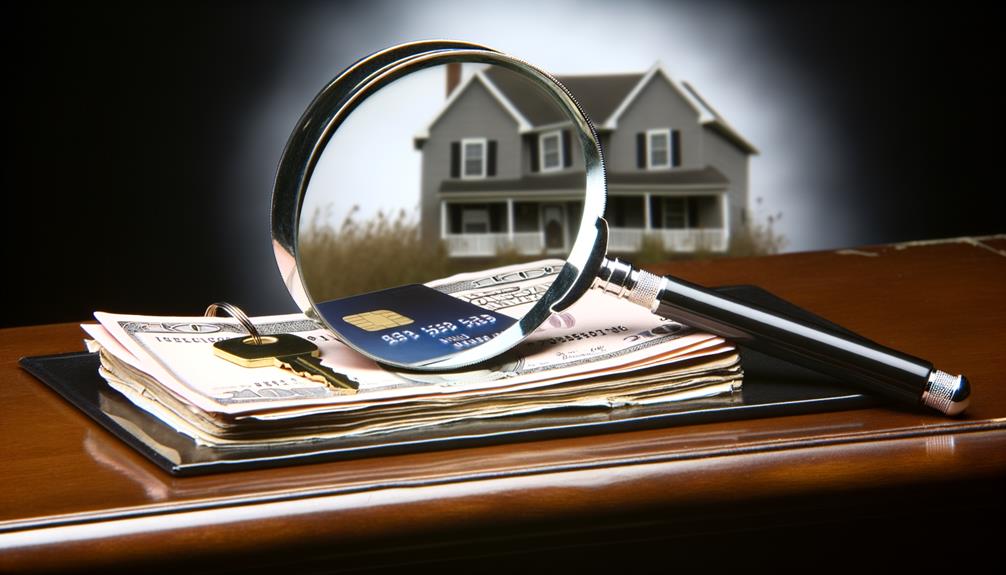
When considering the purchase of a foreclosed house, various financing options present themselves. Traditional mortgages, private financing, and government-backed loans each offer unique advantages and potential drawbacks worth exploring.
In the ensuing discussion, we will evaluate these options in the context of foreclosed property acquisition, emphasizing their roles in facilitating property ownership and investment.
Traditional Mortgage Possibilities
In the realm of purchasing foreclosed properties, several traditional mortgage possibilities are available, including conventional mortgages, FHA loans, and innovative solutions such as renovation loans or home equity lines of credit. These options provide an alternative to the cash-only scenario often associated with foreclosure purchases. Engaging a mortgage lender in the process may provide the necessary guidance.
| Mortgage Option | Description |
|---|---|
| Conventional Mortgage | A home loan not guaranteed by a government agency, often used for foreclosed properties. |
| FHA Loan | A loan insured by the Federal Housing Administration, allowing lower credit scores and down payments. |
| Renovation Loan | A loan that includes additional funds for necessary repairs or upgrades. |
Traditional mortgage possibilities can make acquiring a foreclosed property more accessible and less financially burdensome, thus fostering a sense of belonging and stability.
Private Investor Financing
Beyond the realm of traditional mortgage options, another viable avenue for acquiring foreclosed properties lies in the sphere of private investor financing. This approach can offer speed and flexibility when you're looking to buy foreclosed homes. Essentially, private investors provide hard money, a type of loan to buy properties that might not meet traditional lending standards.
While acquiring properties through private investor financing can fast-track the process, it does come with its own set of considerations. Generally, the interest rate can be higher than traditional mortgages, reflecting the higher risk taken by the investor. Therefore, potential buyers must thoroughly evaluate the terms and conditions of such an agreement, ensuring that it aligns with their financial capabilities and investment goals.
Government-Backed Loans
Often, prospective buyers overlook the potential of government-backed loans as a viable financing option for purchasing foreclosed homes. When buying a foreclosed house, FHA loans can be a practical choice. These loans, backed by the Federal Housing Administration, allow borrowers to purchase homes with a lower down payment, making them an attractive option for many.
Lenders are generally more comfortable with these loans as they come with the assurance of federal backing. For foreclosed homes needing renovations, FHA 203(k) loans offer the dual advantage of financing the purchase and renovation costs. They provide an opportunity to transform a dilapidated foreclosed house into a desirable property.
Thus, government-backed loans can make the dream of owning a foreclosed home a reality.
The Role of Conventional Mortgages
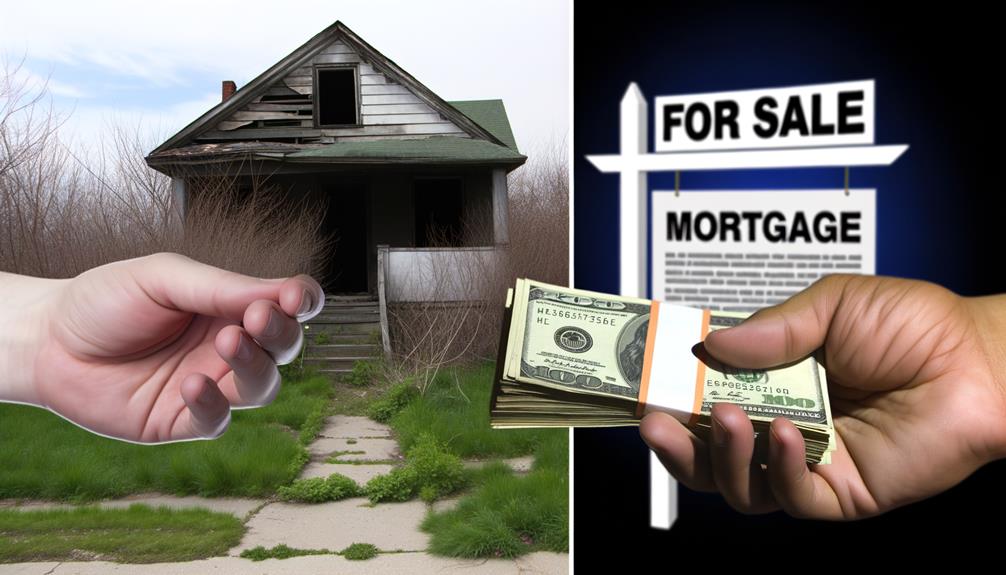
Conventional mortgages play a pivotal role in the purchase of foreclosed houses, necessitating a comprehensive understanding of their function.
A detailed analysis of their benefits, such as potentially lower interest rates and the absence of private mortgage insurance, can illuminate their attractiveness to potential buyers.
However, it's equally critical to explore the risks associated with conventional mortgages, including stringent credit requirements and larger down payments, to ensure an informed decision-making process.
Understanding Conventional Mortgages
In the realm of financing options for purchasing foreclosed homes, conventional mortgages play a pivotal role due to their flexibility and wide acceptance among traditional lenders. They cater to a wide range of home buyers, regardless of the property condition. Unlike other financing options, conventional mortgages extend their scope beyond just the purchase, to include potential renovation projects. This versatility makes conventional mortgages an attractive choice for those considering buying a foreclosed property.
Real estate agents often recommend conventional mortgages due to their broad acceptance and reliability. The sale process involves an evaluation of the buyer's financial stability, creditworthiness, and the value of the property. Therefore, understanding conventional mortgages is vital for potential buyers of foreclosed homes.
Benefits of Conventional Mortgages
Undoubtedly, the allure of conventional mortgages lies in their expansive benefits, especially when utilized for the purchase of foreclosed homes. This type of loan often streamlines the process to buy a home, providing a clear-cut path even when the original homeowner fails to make payments.
By using a conventional mortgage, you enter into an agreement with a traditional lender, which offers a level of security and trust. As a result, your home buying journey becomes less daunting. Additionally, it grants the potential for renovating your newly-bought home, thereby making it a more attractive option.
The benefits extend to financing options, giving you the freedom to choose a financing method best suited to your needs. Thus, conventional mortgages can be a gateway to homeownership without a hefty upfront cash payment.
Risks of Conventional Mortgages
Navigating the realm of conventional mortgages, while offering a pathway to homeownership, also presents a set of inherent risks that every potential buyer should consider carefully.
For those purchasing foreclosed houses, the notice of sale may not accurately reflect the property's market value, leading to inflated bids and a potential financial loss for the winning bidder.
REO properties, while often priced below market value, may come with hidden problems such as outstanding liens or significant repairs, increasing the financial risk.
Additionally, the competitive nature of foreclosure auctions can lead to bidding wars causing the final price to exceed the property's market value.
Thus, potential buyers should approach conventional mortgages for foreclosed properties with caution.
Renovation Loans and Foreclosures
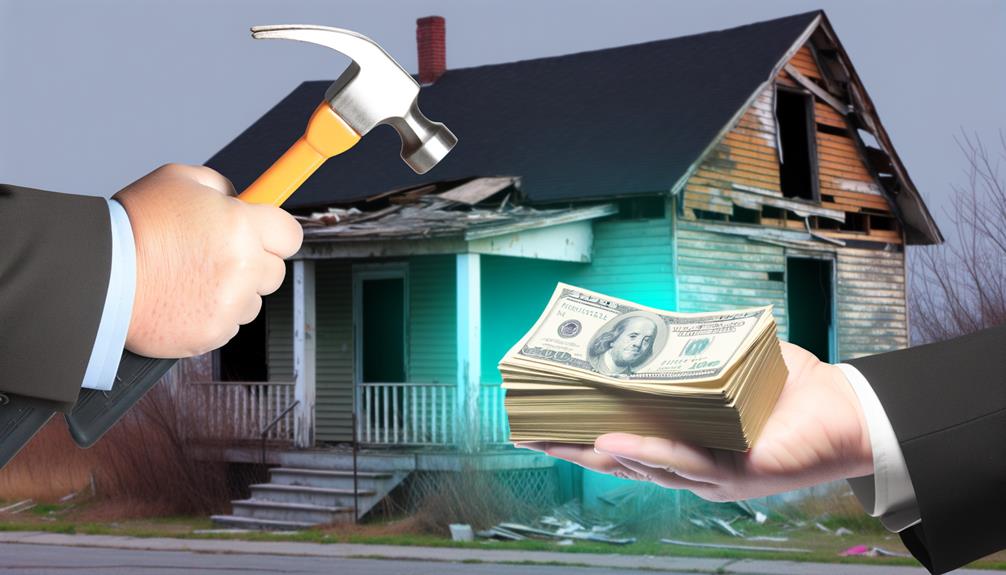
Exploring the realm of foreclosed properties, potential investors often find renovation loans to be a compelling financing option, as these provide the necessary funds to purchase and subsequently rehabilitate homes in need of repair. These loans debunk the common question, 'do you have to pay cash for a foreclosed house?', by offering a viable alternative.
One such option is the FHA 203(k) renovation loans, a government-backed financing scheme specifically designed for the purchase and renovation of distressed properties. These loans, along with other innovative financing methods such as private loans, peer-to-peer lending, and crowdfunding, can serve as additional sources of funding for renovation projects.
For investors seeking a faster financing option, hard money loans, characterized by a quick evaluation process, offer an efficient path to acquire and renovate foreclosed homes.
Buyers can also explore various methods including pre-foreclosure negotiations, short sales, sheriff's sales auctions, bank-owned properties (REO), and government-owned properties to purchase foreclosed homes. These methods often involve alternative financing options such as assumption loans and creative financing arrangements.
Thus, renovation loans and foreclosures together form a robust strategy for potential investors in the property market.
Exploring FHA Loans
Shifting gears from discussing renovation loans and foreclosure strategies, it is crucial to further examine FHA loans and their potential benefits for prospective investors in the realm of foreclosed properties. This article section delves into exploring FHA loans as an alternative to the conventional 'pay cash' approach.
FHA loans offer a viable financing option, especially beneficial for those seeking a foreclosed house. These loans provide a lower down payment requirement, thereby increasing accessibility for a wider range of investors. More uniquely, the FHA 203(k) renovation loans offer an innovative solution, allowing for the simultaneous purchase and renovation of a foreclosure.
However, it is crucial to note other available alternatives. Options such as home equity lines of credit, private loans, and peer-to-peer lending can also facilitate the acquisition of foreclosed properties. Moreover, the potential of acquiring properties with no money through methods like pre-foreclosure negotiations and short sales shouldn't be overlooked.
Hard Money Loans Explained
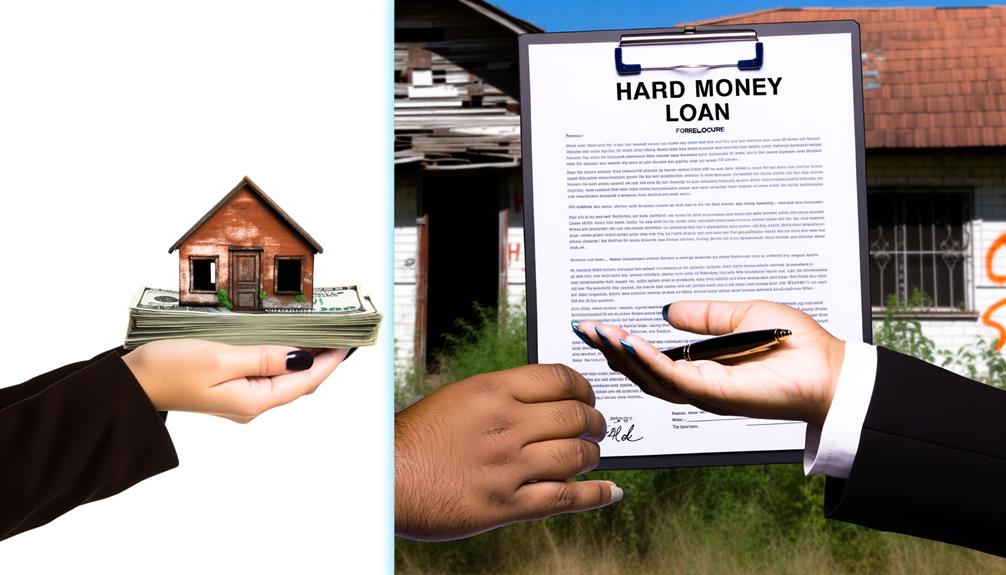
Diving into the realm of alternative financing options, it becomes essential to demystify hard money loans, a high-interest, short-term loan type secured by real estate, primarily used by investors seeking swift access to funds for property purchases or renovations.
Unlike traditional loans, approval for hard money loans is not predicated on the borrower's creditworthiness, but on the value of the property in question. This makes them particularly attractive to experienced investors looking to acquire distressed properties, such as a foreclosed house, without having to pay cash upfront.
The speedy approval and funding process inherent to hard money loans make them ideal for time-sensitive real estate transactions. However, the convenience comes at a cost. Borrowers should be aware that these loans carry higher interest rates and fees compared to conventional financing options.
As such, while hard money loans offer a viable route to property acquisition for seasoned investors, they demand a keen understanding of the real estate market and a calculated approach to risk. The benefits can be significant, but so too can the costs if not navigated with precision and expertise.
Risks of Buying Foreclosed Homes
While hard money loans present a viable financing option, it is imperative to understand the inherent risks and complexities involved in purchasing foreclosed homes. The question, 'do you have to pay cash for a foreclosed house', often arises, but there's more to consider beyond financing.
The risks of buying foreclosed homes include:
- Expensive repairs: Foreclosed homes are typically sold 'as-is'. Therefore, the cost of necessary renovations may be high.
- Hidden defects: Properties may have unreported issues such as structural damage or mold.
- Major system repairs: Significant systems such as plumbing, electrical, or HVAC may require extensive repairs or replacement.
- Preforeclosure stage complexities: Purchasing a home in the preforeclosure stage can be complicated.
- Legal obstacles: The original homeowners may contest the foreclosure.
- Uncertain timelines: The foreclosure process can be lengthy, creating uncertainty in your investment timeline.
- REO property issues: Real Estate Owned (REO) properties may come with additional challenges.
- Competitive market: Due to their lower prices, these properties can be highly sought after, leading to potential bidding wars.
- Administrative delays: Banks may be slow in responding to offers, leading to potential delays in closing.
Finding Foreclosures Near You
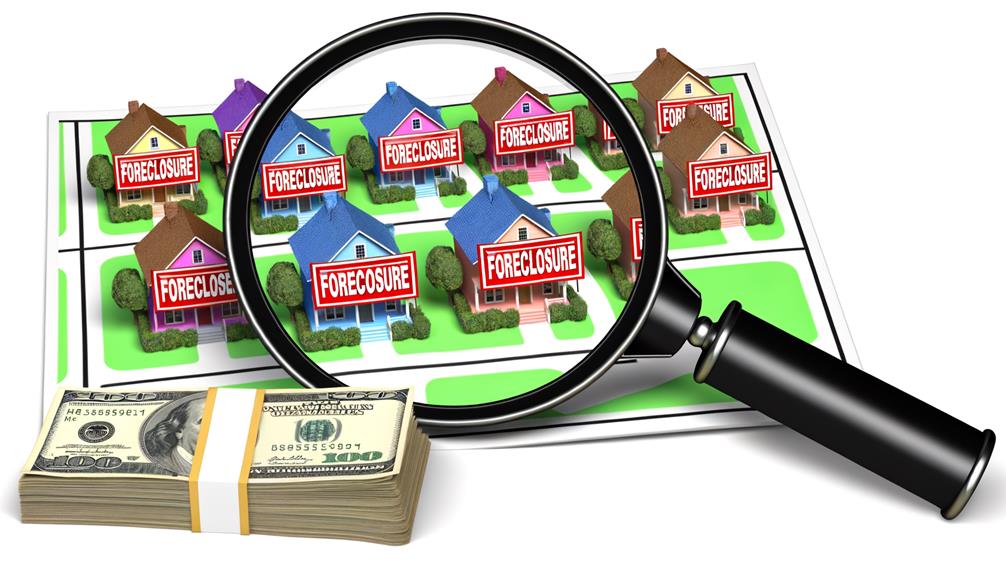
Navigating the process of finding foreclosures near you requires an understanding of various resources, from visiting the county clerk's office for a list of pre-foreclosed properties to exploring public records and contacting lenders for assumption loans. These resources can help you find properties that are available for purchase at a lower price point due to the foreclosure status.
Public auctions are another avenue to consider. These auctions are often advertised in the local newspapers and can include properties that are in the foreclosure process. However, it is essential to conduct due diligence before making any purchases at an auction. This can include hiring a real estate agent who is knowledgeable about foreclosures and can guide you through the process.
Finally, it's crucial to inspect the property before making any offers. This can help you identify any potential issues with the property and help you make an informed decision about the purchase.
| Method | Pros | Cons |
|---|---|---|
| County Clerk's Office | Access to pre-foreclosed properties | Time-consuming |
| Public Records | Wide range of properties | Requires thorough research |
| Lenders | Possible assumption loans | Depend on lender's terms |
Frequently Asked Questions
How Does Buying a Foreclosure Work in Texas?
Buying a foreclosure in Texas involves understanding state-specific foreclosure laws, participating in the auction process, considering mortgage options, estimating potential repair expenses, and employing effective negotiation strategies to secure an advantageous deal.
Should You Sell Before Foreclosure?
Selling before foreclosure can be a strategic move to avoid foreclosure consequences, mitigating losses. Preemptive selling aids in maintaining credit health and enables better financial control, making it a favorable option in certain circumstances.
How to Find Pre Foreclosure Homes Houston?
Finding pre-foreclosure homes in Houston involves a keen market analysis, understanding legal aspects, and employing effective search methods. Financing options are available, and strategic negotiation can lead to acquiring these properties below market value.
How to Buy a Pre Foreclosure in Texas?
To buy a pre-foreclosure in Texas, understand legal considerations, explore financing options, navigate the pre-foreclosure process, apply negotiating strategies, and conduct a thorough property inspection. You don't need to pay cash for the purchase.
Conclusion
In conclusion, acquiring a foreclosed house does not necessitate cash payment. Various financing options, including conventional mortgages, renovation loans, FHA loans, and hard money loans, are accessible.
It is crucial to evaluate these options, comprehend the associated risks, and leverage professional real estate advice. Ultimately, the financing method should align with one's financial circumstances and the condition of the foreclosed property, ensuring a sound investment despite the labyrinthine nature of foreclosures.

